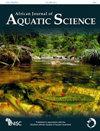Seasonal dynamics in water quality and phytoplankton of four tropical rivers in Ebonyi State, southeastern Nigeria
IF 1
4区 环境科学与生态学
Q3 MARINE & FRESHWATER BIOLOGY
引用次数: 1
Abstract
This study assessed the impacts of human activities and naturogenic processes on the water quality and phytoplankton of four rivers proximal to rice farms in Ebonyi State, south-eastern Nigeria. A range of water quality parameters were measured in conjunction with phytoplankton samples that were collected and identified in the laboratory using microscope and standard keys. The results showed that mean water temperature (30.32 ± 3.34 °C), conductivity (199.11 ± 118.70 μS cm−1) and total dissolved solids (102.60 ± 58.5 mg l−1) were highest in the dry season, while mean flow rate (0.7 ± 0.1 ms−1) and dissolved oxygen (6.15 ± 1.88 mg l−1) were highest in the wet season. Bacillariophyta had the highest mean abundance (6 611 ind. l−1) and biomass (5.52 μg l−1) in the dry season, whereas Chlorophyta had the highest mean diversity (Hʹ = 4.55) and species richness (MI = 1.1) in the wet season. Canonical correspondence analysis showed that hydrologic and climatic factors (temperature, water clarity and discharge) predominantly controlled phytoplankton community structure during the wet season while anthropogenic related factors (phosphate, nitrate and conductivity) regulated phytoplankton during the dry season. Consequently, sustainable management plans for these rivers must prioritise these factors in order to succeed.尼日利亚东南部埃博尼州四条热带河流水质和浮游植物的季节动态
本研究评估了人类活动和自然过程对尼日利亚东南部埃邦伊州水稻农场附近四条河流水质和浮游植物的影响。一系列水质参数与浮游植物样本一起测量,浮游植物样本是在实验室使用显微镜和标准钥匙收集和鉴定的。结果表明:旱季平均水温(30.32±3.34°C)、电导率(199.11±118.70 μS cm−1)和总溶解固形物(102.60±58.5 mg l−1)最高,雨季平均流速(0.7±0.1 ms−1)和溶解氧(6.15±1.88 mg l−1)最高;硅藻的平均丰度(6 611 μ d. l−1)和生物量(5.52 μg . l−1)在旱季最高,绿藻的平均多样性(H = 4.55)和物种丰富度(MI = 1.1)在雨季最高。典型对应分析表明,湿季浮游植物群落结构主要受水文气候因子(温度、水体清晰度和流量)控制,旱季浮游植物群落结构主要受人为因子(磷酸盐、硝酸盐和电导率)控制。因此,这些河流的可持续管理计划必须优先考虑这些因素,才能取得成功。
本文章由计算机程序翻译,如有差异,请以英文原文为准。
求助全文
约1分钟内获得全文
求助全文
来源期刊

African Journal of Aquatic Science
MARINE & FRESHWATER BIOLOGY-
CiteScore
3.90
自引率
7.10%
发文量
31
审稿时长
>12 weeks
期刊介绍:
The African Journal of Aquatic Science is an international journal devoted to the study of the aquatic sciences, covering all African inland and estuarine waters. The Journal publishes peer-reviewed original scientific papers and short articles in all the aquatic science fields including limnology, hydrobiology, ecology, conservation, biomonitoring, management, water quality, ecotoxicology, biological interactions, physical properties and human impacts on African aquatic systems.
 求助内容:
求助内容: 应助结果提醒方式:
应助结果提醒方式:


